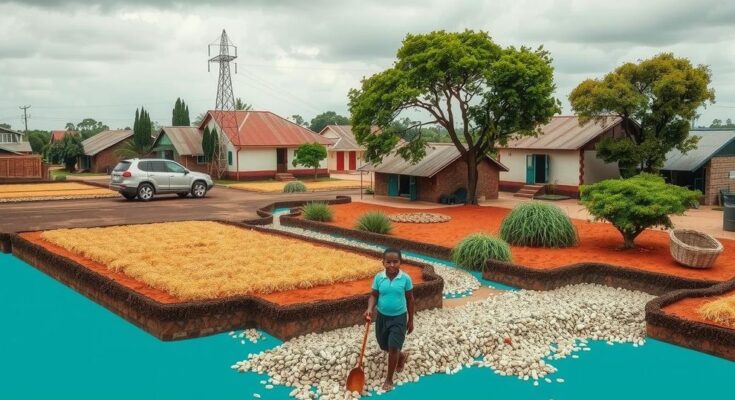Côte d’Ivoire is a model of economic growth in West Africa, achieving an average GDP growth of 6.4% and maintaining low inflation. Challenges such as informal employment and climate change vulnerabilities persist. The IMF’s support is instrumental as the country advances towards upper middle-income status through reforms and domestic revenue strategies. Efforts to improve public services and ensure climate resilience are central to its development agenda.
Côte d’Ivoire stands out as a beacon of economic growth and stability in West Africa, with its economy demonstrating remarkable resilience and a commitment to reform over the past decade. With an average GDP growth rate of 6.4% and inflation of about 2.2%, the country has made significant strides in reducing poverty. However, challenges remain, notably the informal employment sector and vulnerabilities linked to climate change, particularly due to its reliance on cocoa production. The government’s ongoing economic diversification efforts are crucial in bolstering resilience and promoting sustainable growth.
The recent analysis by the IMF during the 2024 Article IV consultations reveals Côte d’Ivoire’s progress towards attaining upper middle-income status. The country’s Minister of Finance and Budget, Adama Coulibaly, affirmed that continuous public investment in vital infrastructure has played a pivotal role in poverty reduction. Furthermore, despite global economic shocks, Côte d’Ivoire has maintained macroeconomic stability and has become the first sub-Saharan African nation to re-enter international financial markets post-COVID-19.
Domestic revenue mobilization is a key focus for the authorities, regarded as essential for providing fiscal space for social infrastructure needs. Olaf Unteroberdoerster, the IMF Mission Chief, emphasized this point, highlighting that these efforts contribute to maintaining Côte d’Ivoire’s good credit rating amidst regional challenges. To enhance revenue collection, a comprehensive medium-term strategy has been adopted, aiming for a fairer tax system that promotes autonomy and garnering public support.
To stimulate private sector engagement, the Ivoirien government is committed to enhancing public service quality—particularly in energy—and fostering better governance. The aim is to reduce informal employment, address gender inequalities, and facilitate business registration, all while complying with Financial Action Task Force mandates to bolster anti-money laundering efforts.
Côte d’Ivoire faces notable climate change challenges, notably agricultural reliance and coastal vulnerabilities. The IMF supports the government’s ambitious agenda to integrate climate strategies into public finance management, governance, and agriculture. As part of its initiatives at COP29, the Ivoirien government announced a broad spectrum of proposals designed to attract climate financing and promote sustainable growth, such as establishing a green finance facility and accelerating adaptation project execution.
Côte d’Ivoire has emerged as a dynamic force in West Africa’s economy, characterized by robust growth and stability. Over recent years, initiatives focusing on economic transformation and environmental sustainability have become pivotal to the country’s ongoing development strategy. The Ivoirien government faces the dual challenge of fostering economic growth while addressing pressing climate change vulnerabilities, particularly given its dependence on agriculture, specifically cocoa production. Engagement with international partners, notably the IMF, underlines the structured approach taken to navigate economic reforms and climate resilience effectively.
Côte d’Ivoire’s ability to maintain high economic growth while tackling fiscal and climate-related challenges reflects its commitment to robust reform and strategic investment. As the country strives toward achieving upper middle-income status, the IMF’s support and the prioritization of domestic revenue mobilization are crucial. Through enhancing public services, improving governance, and implementing climate resilience measures, Côte d’Ivoire is positioning itself for sustainable development amidst the reality of global economic shifts and environmental threats.
Original Source: www.imf.org




